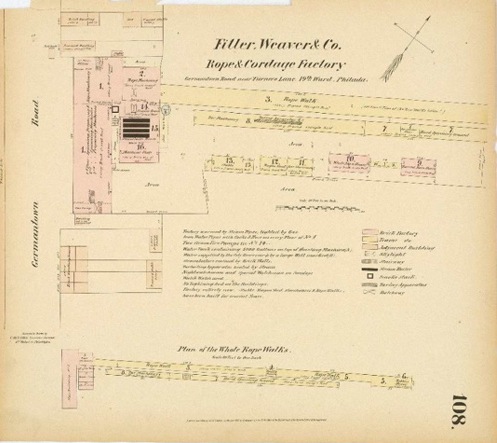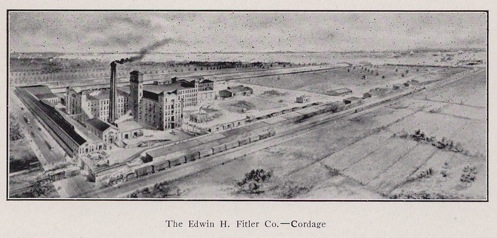
"Fitler, Weaver & Co, Rope & Cordage Factory, Germantown Road and Turners Lane, 19th Ward, Philada." (1866).
Fitler, Weaver & Co.'s Cordage Works
"Are the most extensive in Philadelphia, and, with probably two exceptions, the largest in the United States. They are also among the oldest established rope manufactories in this country, having been founded by Michael Weaver in 1817. At that period, cordage spinning was carried on in the primitive way, and gangs of rigging were laid by hand, the neighbors being called in to assist. Subsequently horse power was employed for this purpose, but it was not until recently that steam power was applied, by means of which large Marline Ropes are now made with the same facility as twines. In fact, so great has the progress been, that now a gang of rigging suited for the largest vessel in the Government Marine can be finished and delivered within three days after receipt of the order. The original Rope Walk, with its hand spinning apparatus, is still in use by the present firm, who, however, have introduced a Corliss engine of forty horse power, and made other improvements that adapt it to finishing fine cordage. In 1847, Edwin H. Fitler became connected with the firm then carrying on the business, and possessing executive talents of a high order, soon made his influence felt in the firm's affairs. He saw that, for want of a mill possessing improved machinery, the trade of the South and West was passing through Philadelphia to the New York and Eastern manufactories, and he urged upon his partners the erection of works that would compete with any in the United States. These were begun and finished, but within ten days after their completion, were destroyed by fire. Another and larger factory was immediately erected on the former site, at Germantown road near Turner's lane, but this also was burned in July, 1866. Within four months, another mill was erected in accordance with plans drawn by Mr. Fitler, and this is now without doubt the finest and most conveniently arranged Cordage Factory in the United States.
"The main building is of brick, three stories high, one hundred and eighty-four feet long, and fifty-eight feet wide. There are also attached an engine-room, which contains, besides the engine, two steam fire pumps, a boiler-room, and a machine shop twenty-four by forty-six feet All these buildings are of brick, with gravel roofs. The factory is warmed by steam and lighted by gas and every precaution is taken to guard against fire. There are iron water pipes with cocks and hose on every floor. On the top of the Hoisting Machine is a tank containing five thousand gallons of water, supplied from the City Reservoir, and a large well in the rear of the engine-room. The steam-boilers are enclosed by brick walls, and the tar-boiling apparatus is heated by steam. In the main building are all the machines of modern construction that are best suited to spinning and preparing rope and cordage. The machinery is propelled by a Corlias engine of two hundred and fifty horse power, and has a capacity for performing work that would have required by the old process of hand-spinning at least a thousand men. Extending at right angles from the factory proper, is a ropewalk thirteen hundred feet long, and on the premises are numerous buildings auxiliary to the business. It is probable that the cost of this factory and its machinery was not less than a quarter of a million of dollars. About three hundred men are employed in the two factories, which consume each day from sixty to seventy bales of Manilla, Russian and American Hemp, and produce about seven tons of Rope and Cordage daily, or 4,500,000 pounds per annum. The facilities for manufacturing are so complete, and the machinery so perfect, that the Cordage cannot be surpassed in quality by any made in the world.
"EDWIN H. FITLER, who is now the senior partner in the firm, and principal owner of the works, is a native of Philadelphia having been born in the district of Kensington in 1825. He belongs to the energetic and progressive order of manufacturers, of whom it is often said that Philadelphia has too few. He has established a private telegraphic wire from the store on Water street to the Factory, which passes directly through his house in the city, by means of which not only orders and business reports, but private and domestic messages may be transmitted by telegraph. The system he has organized is so complete that the affairs of a vast and complicated business are managed with the minimum of trouble and labor. Every evening, an amount of the various kinds of hemp on hand is taken, and the quantity of the different sizes of rope in store is made up, and thus; every morning he has a complete and exact report of the state of affairs ready for his guidance during the day. Every morning also, the report of the night-watchmen, registered on their tell-tale clocks, is submitted, and their fidelity in the discharge of their duties examined.
"Among the minor but nevertheless novel and useful items of counting-house management, is a Diary or daily journal of events. For nearly twenty years this firm have kept, in an appropriate book, a record of each day's events, including an abstract of every important business conversation, a copy of every telegraphic despatch sent or received, and of all orders and purchases; and its utility, especially in cases where options or refusals have been given for a limited time, has been frequently demonstrated.
"Messrs. Fitler, Weaver & Co., have a large warehouse at 23 North Water street, for the sale of their cordage, in connection with which is a store containing a full and complete stock of Naval supplies. Besides them, they occupy four other stores for storage purposes.
"The partners in the flrm are EDWIN H. FITLER, MICHAEL WEAVER, and CONRAD CLOTHIER."
—© Leander Bishop, Edwin Troxell Freedley, Edward Young, A History of American Manufactures from 1608 to 1860 (1868), pp. 87-89.
-----
Edwin H. Fitler Co.—Cordage

[Plant in Frankford. Delaware River is at right. Demolished around 1941 to expand the Frankford Arsenal].
"The cordage industry started early in the history of Philadelphia, ropewalks being established a few years after the arrival of Penn. Up to 1850 this was the method of manufacture, but now a large part of the work is done by machinery. Formerly this industry was confined mainly to supplying ropes for ships, but the invention of the self-binding harvester gave it a new direction.
"It is old of Deering that in 1878, when he was looking for a twine to be used in his self-binder, he called on Edwin H. Fitler, head of the Fitler cordage works, Philadelphia, and explained what he wanted. From the unassuming way in which Deering stated his needs, Fitler concluded that the order would be a small one. "What you want, " he said, "is a single strand twine, which cannot be made without a new line of machinery. I regret to say that I cannot afford to do this for one customer." "Well," said Deering, "I think I may need a good deal in the long run, though I wish to begin with not more than ten carloads." Ten carloads! For a moment Fitler was dazed, but only a moment. It was his chance and he knew it. Years afterward, he was fond of telling how he "made a million-dollar deal with William Deering in two minutes." The demand for binder twine has grown since that date to such proportions that its manufacture is now one of the most important parts of the cordage and twine industry.
"Originally, hemp and flax were the only fibers used in the manufacture of rope, then came manila hemp, sisal, ixtle and jute, so that now very little is made from hemp and flax; jute, manila hemp and sisal being the leading raw materials. In 1899 there were thirteen cordage factories in Philadelphia area with an output valued at $6,162,000; in 1909 there were only eight, with an output valued at $3,325,000. In 1912 there are twelve, most of them being located in Frankford and Bridesburg."
— ©Manufacturing in Philadelphia, 1683-1912, pp. 31-32.
-----
Resources:
"Fitler, Weaver & Co, Rope & Cordage Factory, Germantown Road and Turners Lane, 19th Ward, Philada." HGS #108 (1866).
"Edwin H. Fitler & Co., Cordage Factory, Philadelphia." HGS # 742 (1873).